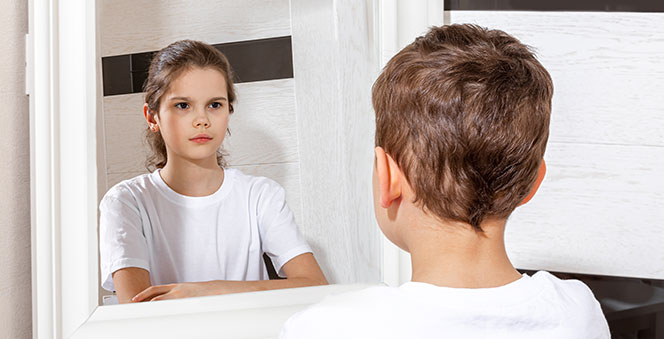Home is the place where a child gets introduced to values, Gender Equality, and stereotypes. India has a patriarchal society that shapes the children according to their gender. Starting from the way they get treated, the opportunities they receive, to their behavior, everything is decided based on gender.
Studies have proved that a child’s sense of individuality (being male or female) is established predominately by the way others treat them. The external environment plays a major role in teaching them that boys and girls are different individuals and have different interests and abilities.
The initial differentiation starts with the colors they wear and the toys they play with. These gender-assigned roles and differences, known as the ‘gender binary’ creates an unquestioned rationale about what men and woman are capable of and what their characteristic traits will be.
For example, males considered superior are expected to be independent, stoic, dominant, and loud. Whereas females are expected to be docile, dependent, emotional, and submissive.
Now the question is how does it affect society? These norms limit an individual’s space and wish to explore themselves and bound them to abide by the stereotypes defined by society. This further results in experiencing violence, unequal pay and opportunities, harassment for women and experiencing substance abuse, lack of emotional balance, and societal pressure to run a family for men. All these issues take a toll on their mental health and create a toxic environment.
However, these widespread stereotypical ideologies and norms can be challenged and changed by promoting gender equality at home. Some points that we can keep in mind are:
1. SET AN IDEAL EXAMPLE, AND SHOWCASE THE BEHAVIOR OF CARE AND KINDNESS TO YOUR SPOUSE FOR YOUR CHILD TO FOLLOW.

2. AVOID STEREOTYPE BELIEF SYSTEMS ABOUT BOY AND GIRL CHILDREN, AND GIVE EQUAL OPPORTUNITIES.
The value system and core beliefs come from the upbringing the child gets in the home, hence it is very important for the parents to treat their kids both boy and girl in a similar way, and not distinguish them in terms of performing according to age-old stereotype norms for example, parents should not stress on the girl child taking interest in kitchen jobs whereas allowing the boy child to play around all day.
3. TEACH BOTH YOUR GIRL AND BOY CHILD THE IMPORTANCE OF BEING INDEPENDENT.
Our Indian society is full of age-old stereotype norms and taboos, where girls are always told to be the household caretaker whereas boys are trained to be the bread and butter earners. This is a high time where these taboos need to declare obsolete and the importance of independence should be taught to both girls and boys.
4. EMPOWER BOTH OF THEM TO SPEAK OUT AND GIVE OPINIONS.
Having opinions and expressing them is a basic right of an individual which should not be judged on the basis of the gender the individual has. It is widely seen that the person (the male member) who runs the family gets a right to express their opinion just because they provide financial support whereas the other family members who depend on the male member are deprived of the right to showcase their say on anything and everything. Only by giving both of them this power to equally express themselves, we can enable equality in the decision-making system of a family.
5. TALK ABOUT GENDER EQUALITY WITH YOUR KIDS.
Today’s generation is way smarter and more sensitive than we were in our childhood, thus it is a very good idea to discuss gender equality with the kids so that this concept does not come as a bouncer when they see it happening around them. This practice of discussion will make them more aware of this concept and help them understand it better.
These few tips will surely help you in promoting this social cause. This movement will not only make our girls strong and independent but will also educate our boys to handle independent girls. The sense of equality will reduce the culture of violence and train our boys to be emotionally mature, sensitive, and kind.
Whereas this will encourage our girls to be financially independent and motivate them to stand in parallel with the boys. If this movement gets practiced in every home, one day India will surely see the light of gender equality.




